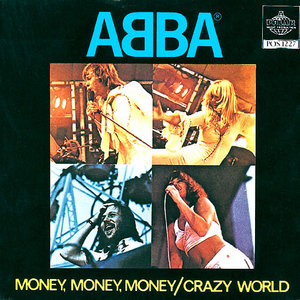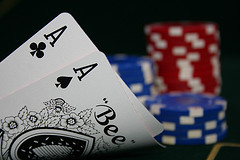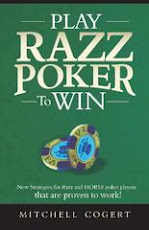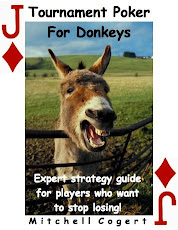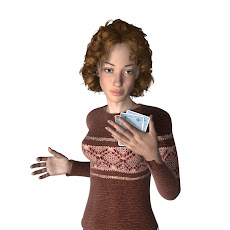 Image via WikipediaHow I Won Over $100,000 at the WSOP Main Event
Image via WikipediaHow I Won Over $100,000 at the WSOP Main EventI thought I would share my approach to the 2011 WSOP Main Event since it may help you in your tournament strategy.
In many ways the Main Event is easier than your local tournament. The Main Event has 2 hour levels, a slow increase in blinds, is mostly played nine handed, and you get a deep chip stack of 30,000. While your local tournament becomes a luck-fest at the 6th level, at the Main Event the luck-fest is on the 6th day.
I re-read my book, Tournament Poker: 101 Winning Moves, as a reminder before I started playing at the Main Event. You have my poker book, right? :-)
Next, I set up my goal to double my stack each day. It would result in my taking the 30,000 in chips and turning it into 8 million for the final table.
My strategy was the following:
- to present myself as a predictable ABC player to make it easier to steal pots
- to play opposite my opponents table image to take advantage of their weakness
- to avoid difficult decisions on any one hand so I could survive the event
- to look for tells, especially if the player to my left would fold or enter a hand
- to avoid getting knocked out by a clueless player--no bad beats at the wrong time, please.
Here is a brief review of my key hands:Day 1 (July 8, 2011):Starting chips: 30,000
An aggressive player raised in early position, I called on the button with QQ. The board came Jack high. He bet and I called. The turn was a rag. He bet and I called. The river was a rag. He checked-called my bet. He had A-J.
I misplayed KK against one opponent. I raised and he called in position. The flop was A-Q-Q. I checked and he checked. The turn was a rag. I bet and he called. The river was a rag. I bet and he called. He hit a runner runner flush.
One key tell was that I knew when the player to my left would play his hand pre-flop. I used this to my advantage in the following key hand:
I made a min-raise with 7-7, knowing this guy wanted to raise. He raised, but it was no longer a big raise, so I could afford to see the flop. The flop was T-7-4. I bet into him and he raised. I called. The turn was a rag. I checked and he checked behind. The river was a rag. I bet and he called with his J-J.
My observations from Day 1 tended to be true throughout the tournament:
- Players at my table were mostly playing ABC poker, as I believe they were afraid to make a mistake.
- I took a check as a sign of weakness, so I'd bet and take down the pot.
- Opponents still don't realize their own tells.
- Don't show your hand to an opponent who folds. The player to my left did this once, and it made me realize he liked to 3 bet with a wide range of hands.
- The best tell is noticing betting patterns; not just c-betting or not, but how they play on different streets.
Ending chips: 50,000 (-10,000 from objective)
Day 2:Starting chips: 50,000
The Day 2 competition was easier than Day 1. I felt there was more fear at the table than Day 1. In fact, a few players pushed with garbage as if they were saying:
"I'm scared as hell. I can't take it anymore!"
I was mostly card dead, so I did not accumulate as many chips as I would have liked.
Ending chips: 86,000 (-34,000 from objective)
Day 3:Starting chips: 86,000
On Day 3, the play started to get more challenging.
On the first hand of play I was on the button and the big blind was missing. Everyone folded to the woman on my right, who raised. I had Q-9 and called. The flop was perfect K-J-T. She bet and I raised. She called. The turn was a rag. She checked and folded.
A few hands later, she raised again. I found Ah-Ad. I raised. She called. We were heads up. The flop was Kd-Td-4s. She bet into me! I put her on A-K since the bet was too big, I thought, to be a defensive one. I just called. The turn was a 6h. She bet big again. I called. The river was a 7d, completing a possible flush. She bet again, without hesitation.
What should I do? This was now a big pot, and I wondered if I had let her get her flush.
I thought for a moment, and it didn't add up. I mean, if she hit the flush on the river, she would have to think for a moment to size her bet. Especially since I could have the nut flush. I called. She had As-Jc and had damaged her chance to survive this day.
It was a big win for me. Except, later on, I ended up giving most of these new chips away when my flush lost to quad tens.
On Day 3, I was finally fortunate as I was dealt excellent starting hands.
In the BB, a player moved all-in. I found K-K and called. He made 22X BB all in move with A-J offsuit!? My Kings were ahead until the river, as the Ace hit. While it took my stack down by a third, I suddenly went on a mini rush.
The next hand I raised with 9-9. No one called.
The next hand I raised with A-A. No one called.
The next hand I raised with A-A again. No one called.
Back on the BB, I found A-K. 5 players called and I moved all-in. No one called.
A new player sat down to my right after the woman player was knocked out. He was a talker. And, he wanted everyone to know he knew the big TV poker stars and, of course, his stack was hurt due to bad beats. I was under the gun and raised with 9-9. Everyone folded to this guy in the BB. He called.
The flop was all rags with 2 hearts. He checked and I bet the pot. He moved all-in--which was about 65% of my stack. This was a tough spot since this was exactly the situation I was trying to avoid. A clueless player making a stupid play to knock me out. While this would not knock me out, it would be very tough to come back from a beat here. I folded.
The good news, though, was that the first hand back from the dinner back I was on the BB and found K-K. This guy moved all-in with A-J....he had over 25x the BB. I called. He got pissed when he did not improve and he started his speech about how unlucky he was.
Ending chips: 249,700 (+9,700 versus objective)
Day 4Starting chips: 249,700
This was the most difficult table ever for me. Little did I know that four of the players who started at this table (including me), would end up finishing in the top 125 finishers in this event!
Seated on my right was Heinz (who made it to the final table. He is an excellent player and a good guy. I wish him the best in November). To my left were two other professional internet players.
After a while it was clear that these players loved to 2 bet and 3 bet pre-flop with a wide range of hands. Heinz was 3 betting players to his right. And, the players to my left were three betting as well. In fact, I believe the two players to my left 3 bet me like a ten times before the dinner break. Each time I folded.
At the dinner break, I was very very frustrated. I like to play flops and these characters were forcing me to fold. I decided that if it happened again, I would four bet.
Sure enough, in one of the first hands after the break, I raised and the player to my left 3 bet. It got back to me and I 4 bet. He folded.
The result of my doing this one time caused both the players to my left stopping that 3 betting of my raises. And, it led to my biggest pot win of the event....
I was in early position and raised with 7-6 suited. The guy to my left folded, but the next net pro just called. Heads up, the flop was 6-6-3 with a possible flush draw. I did not have the flush draw, but I knew my opponent would bet here with any hand, so I checked.
He bet. I now put in a big raise, as if on a flush draw. To my surprise, he re-raised! I moved in and he insta-called! He turned over 6-5 suited (no flush draw). The turn was a T. And when the river was a 2, rather than chopping the pot, I won big.
Ending chips: 757,000 (+277,000 versus objective)
Day 5Starting chips: 757,000
Day 5 started with Erick Lindgren at my table. He made a bad play early on with pocket T's by moving all in after a raise from a player with A-A. However, he hit his T on the flop to double up.
I had some hands at this table and I was able to grow my stack a little. But...then...
I got moved to a new table, which was more aggressive. The player to my right was a nice guy, who spoke little English, by the name of Staszko. His playing style is much tighter and more cautious than Heinz. (Staszko is a good guy. And, I wish him the best at the final table.)
I was card dead here as well. And, almost every time I raised, the player to my left would call. The flop would miss me, and sometimes I would bet and sometimes I would check and give the pot up. The reason not to c-bet every time was to project strength, and take down the pot. Too often players c-bet the flop, get called, and then give up on the turn with a check-fold.
Unfortunately, I was card dead most of the entire time. It was very frustrating. On the last hand of the night, I doubled up with K-K.
Ending chips: 630,000 (-330,000 versus objective)
Day 6 (July 17, 2011):Starting chips: 630,000
Lots of big stacks at the first table. While I was not one of the big stacks, I was confident I could make a comeback.
I raised on the SB, but the Russian player on the BB, moved all-in. I folded. Later that round, I was on the button with A-T and raised first in pre-flop. This guy re-raised and I moved all-in. He called with A-Q. I got lucky and hit my T to double up.
I got J-J in a middle position and raised. A woman who had not played a hand in about 2 hours, moved all-in. Good grief. If I lose this hand, I am as good as out of the event. I folded the Jacks.
I got moved to a table with Allan Cunningham who had about the same chip stack size as me.
Given my stack size, I moved in after a raise with pocket 4's and pocket Jacks. My opponent called both time and lost with K-J and A-3 suited.
For the next 3 hours, I did not play a hand. It was incredible how ugly the cards looked.
Right before the dinner break, a player raised in middle position. I found K-K and 3 bet about 3x his bet size. My opponent thought for a while and moved all-in. I insta-called. My opponent showed A-T suited. If I win here, I would have about 2 million in chips...and that was my chip goal for the day.
The flop was all rags, but the turn....
I finished in 71st place and won over $100,000. It was a great financial win, but I was very disappointed.
If you have any questions, please don't hesitate to ask.







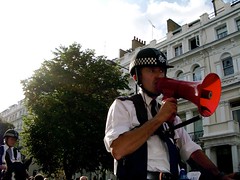

![Cover of "Do the Right Thing [Blu-ray]"](http://ecx.images-amazon.com/images/I/51SJpuNUqmL._SL300_.jpg)







